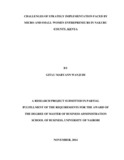| dc.description.abstract | The major drive behind this study was to investigate challenges of strategy
implementation faced by micro and small women entrepreneurs in Nakuru County,
Kenya. The major objectives of the study were to; determine strategy implementation
challenges faced by women entrepreneurs and determine the measures taken by the
women entrepreneurs to address the challenges faced during Strategy Implementation
process in Nakuru County, Kenya. The study used descriptive survey research design to
determine strategy implementation and challenges facing small and micro women
entrepreneurs in Nakuru County, Kenya. The target population of the study included all
small and micro women enterprises in Nakuru County (see appendix ii).A convenient
sampling method was used for this study where the researcher only identified the
respondents that can be interviewed based on their accessibility and availability for the
interview. The target sample was 384 micro and small women enterprises in Nakuru
County. Kenya. Women entrepreneurs in Nakuru County were the respondents for the
study. Questionnaires were the instruments of data collection for this study. The
respondents consisted of the owners and managers of women enterprises in Nakuru
County Kenya. Questionnaires were administered by the researcher during working hours
of the week. Drop and pick later method was applied where respondents had no time to
respond immediately. Secondary data was gathered from library material, journals,
reports, media publications and various Internet search engines covering the women
entrepreneurship in Kenya. The Statistical Package of Social Sciences (SPSS) was used
to process and analyze the data in order to determine the relationship between the
variables. Descriptive statistics such as frequency distributions, mean, percentages and
frequency tables were used to summarize and relate variables which were attained from
the administered questionnaires. The findings from the study were presented using tables.
The study established that internal and external factors were challenges of strategy
implementation. Structure, style of management, communication, employees’ skills,
culture influenced effective strategy implementation. Political, economic, social-cultural,
technological and ecological were the external factors that influenced effective strategy
implementation. Therefore, the study recommended that for Women SME’s to realize
effective strategy implementation, both internal and external factors should be understood
including structure, employee skills, styles of management strategy, political, economic,
social-cultural, technological and ecological factors.
Key Words: Strategy Implementation, Challenges of Strategy Implementation, Micro
and small women entrepreneurs. | en_US |

